Cogency v2 n2
Cogency v2 n2
Cogency v2 n2
You also want an ePaper? Increase the reach of your titles
YUMPU automatically turns print PDFs into web optimized ePapers that Google loves.
COGENCY Vol. 2, N0. 2, Spring 2010<br />
experiment or argumentation (OC § 94). Rather it is simply acquired in the<br />
process of learning a language – through practice, imitation, training and<br />
instruction (OC § 144). To learn a language is, to use Austin’s phrase, to<br />
learn how to do things with words, and this involves not only, e.g., expressing<br />
feelings, asking questions, giving instructions and telling stories, but<br />
making judgments and inferences as well. For example, we learn concepts<br />
by learning to apply them in certain ways (rather than others), and this typically<br />
involves making and accepting certain judgments, and not making, or<br />
rejecting, others (OC §§ 81, 82). It not only within this set of practices, but<br />
against this background Weltbild, that our actual inquiry, discovery, debate<br />
and argumentation occurs (OC §§ 162, 167).<br />
If deep disagreements are really intra-framework disagreements arising<br />
from different forms of life and world-pictures, then they seem well beyond<br />
the scope rational mediation. It would seem, then, that there are pronouncedly<br />
Wittgensteinian elements to the picture Fogelin presents, and<br />
that, initially, these elements support the thesis that no rational resolution<br />
to deep disagreements is possible.<br />
4. The Nature of Deep Disagreement Revisited:<br />
A Partly Corrosive Clarification of the Problem<br />
To use Campolo’s (2007: 1) apt phrase, then, Fogelin’s thesis is that “there<br />
is a kind of disagreement which will always turn our spade” – which is constitutively<br />
impervious to rational resolution. Yet, why call this disagreement<br />
at all? What makes disagreement possible, if resolution – indeed the conditions<br />
essential to the marshaling of reasons – is impossible?<br />
4.1. Fathoming the Depths of Deep Disagreement<br />
Not all differences are disagreements. Disagreement is the contrary of agreement.<br />
Thus, it would seem that disagreement is only possible where agreement<br />
is also possible. Yet, agreement is only possible where understanding<br />
is possible, and understanding, being the result of successful communica-<br />
46








